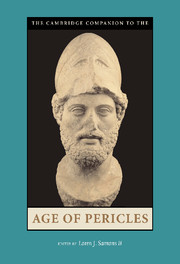Book contents
- Frontmatter
- Introduction: Athenian History and Society in the Age of Pericles
- 1 Democracy and Empire
- 2 Athenian Religion in the Age of Pericles
- 3 The Athenian Economy
- 4 Warfare in Athenian Society
- 5 Art and Architecture
- 6 Other Sorts: Slaves, Foreigners, and Women in Periclean Athens
- 7 Drama and Democracy
- 8 The Bureaucracy of Democracy and Empire
- 9 Plato’s Sophists, Intellectual History after 450, and Sokrates
- 10 Democratic Theory and Practice
- 11 Athens and Sparta and the Coming of the Peloponnesian War
- Conclusion: Pericles and Athens
- Bibliography
- Index
7 - Drama and Democracy
Published online by Cambridge University Press: 28 March 2009
- Frontmatter
- Introduction: Athenian History and Society in the Age of Pericles
- 1 Democracy and Empire
- 2 Athenian Religion in the Age of Pericles
- 3 The Athenian Economy
- 4 Warfare in Athenian Society
- 5 Art and Architecture
- 6 Other Sorts: Slaves, Foreigners, and Women in Periclean Athens
- 7 Drama and Democracy
- 8 The Bureaucracy of Democracy and Empire
- 9 Plato’s Sophists, Intellectual History after 450, and Sokrates
- 10 Democratic Theory and Practice
- 11 Athens and Sparta and the Coming of the Peloponnesian War
- Conclusion: Pericles and Athens
- Bibliography
- Index
Summary
In fifth-century Athens tragedy, satyr drama, and comedy, together with the largely choral dithyramb, achieved distinct generic forms and a level of artistic refinement and portability that ensured their continuing vitality and popularity throughout the Greco-Roman world to the end of antiquity and, in the case of tragedy and comedy, into our own world. While we admire the artistic qualities of Athenian drama, it is worthwhile also to ask in what ways its development and success can be related to the simultaneous development of democracy, particularly during the age of Pericles and the Athenian empire, for exploring the relationship between these principal artistic and political products of fifth-century Athens cannot but enhance our understanding of each.
In Attica, drama at the polis level was attached to two annual, state organized Athenian festivals for Dionysus: the spring City or Greater Dionysia as early as ca. 501 and from ca. 440 the winter Lenaea as well; drama was also performed locally in the deme-organized Lesser or Rural Dionysia. But drama was hardly confined to democratic Athens: each of its dramatic forms (tragedy and satyr drama, comedy, and the dithyramb) is attested before the democracy as well as in other Greek locales. Although a reliable record of drama at the Dionysia begins only ca. 501, at least tragedy seems to have become significant under the (comparatively populist) tyranny of Peisistratus in the sixth century; whether and in what ways the organization of the dramatic festival(s) figured among Cleisthenes' reforms cannot now be determined.
- Type
- Chapter
- Information
- The Cambridge Companion to the Age of Pericles , pp. 179 - 195Publisher: Cambridge University PressPrint publication year: 2007
- 4
- Cited by



